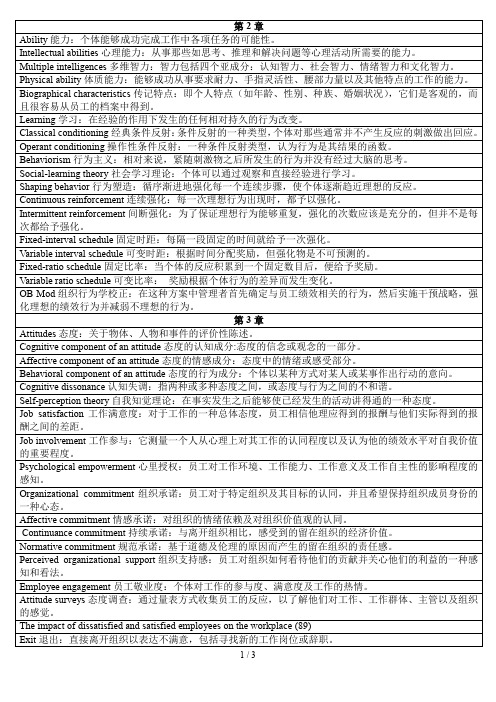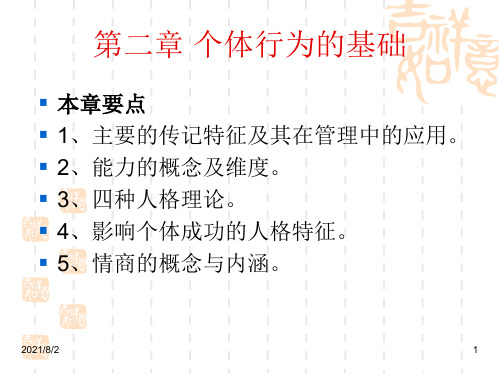组织行为学:个体能力Ability
- 格式:docx
- 大小:106.47 KB
- 文档页数:5


A能力(ability):个体能够成功完成工作中各项任务的可能性。
缺勤率(absenteeism):员工没来上班的现象。
迁就(accommodating):冲突中一方愿意把对方的利益放在自己的利益之上。
行动研究(action research):首先系统地收集信息,然后在信息分析的基础上选定变革行为。
解体阶段(adjourning stage):群体发展的最后阶段,人们关注如何做好善后工作,而不是任务业绩。
情感(affect):一种对人们体验到的所有的感情的统称。
情感强度(affect intensity):不同个体在体验自己的情感时表现出来的强度差异。
情感承诺(affect commitment):对某个组织的情感归属以及对该组织所持价值观的信奉。
情感成分(affective component):态度中的情绪或感受的一部分。
情感事件理论(affective events theory,AET):一个认为工作场所中的事件能够影响员工的情感反应进而影响工作场所中的态度和行为的模型。
随和性:(agreeableness):一种人格维度,描述个体是合作的、热情的和信赖他人的。
锚定偏见(anchoring bias):人的一种倾向,指的是人们往往以最初获得的信息为基点,从而难以根据后面获得的信息做出合理的调整。
人类学(anthropology):用于了解人类及其活动的社会研究。
价值探索(appreciative inquiry,AI):致力于确定一个组织的独特品质和特殊优势,这些因素可以成为员工改善工作绩效的基础。
仲裁人(arbitrator):运用权威来达成协议的第三方。
评价中心(assessment centers):使用一套绩效模拟测验来评估求职者的管理潜能。
态度(attitude):关于物体、人物和事件的评价性陈述。
归因理论:(attribution theory):当我们观察某一个体行为时,总是试图判断它是由内部原因还是外部原因的。




组织行为学:个体能力Ability能力,一个人完成一项工作的能力有两个组成部分,第一是此人从事某项活动的天资(智力天资和体力天资)即天生的潜能,第二是充许他发展其潜能的学习机会。
Ability refers to an individual’s capacity to perform the various tasks in a job. An individual’s overall abilities are essentially made up of two sets of factors: intellectual and physical abilities.Intellectual abilities are those required to do mental activities. Physical abilities are those required to do tasks demanding stamina[ ♦♦✌❍♓⏹☜]毅力, 耐力,dexterity [♎♏♦♦♏❒♓♦♓]灵巧, 机敏, strength, and similar skills.Contrary to与...相反[ ⏹♦❒♏❒✋] what we were taught in grade school, we weren’t all created equal.Individual’s overall abilitiesAn individual’s overall abilities are essentially made up of two sets of factors: intellectual and physical abilities.1. Intellectual abilitiesIntellectual abilities are those required to do mental activities.1.1IQ testsIQ tests are designed to ascertain one’s general intellectual abilities. So, too, are popular college admission tests like the SAT and ACT and graduate admission tests in business (GMAT), law (LSAT), and medicine (MCAT)1.2Dimensions of intellectual abilitiesThe seven most frequently cited dimensions making up intellectual abilities are number aptitude, verbal comprehension, perceptual speed, inductive reasoning, deductive reasoning, spatial visualization, and memory.(1)Number aptitudeAbility to do speedy and accurate arithmetic__ Job example: accountant __ computing the sales tax on a set of items(2)Verbal comprehensionAbility to understand what is read or heard and the relationship of words to each other __ Job example: plant manager __following corporate policies(3)Perceptual speedAbility to identify visual similarities and differences quickly and accurately __ Job example: fire investigator __identifying clues to support a charge of arson (4)Inductive reasoningAbility to identify a logical sequence in a problem and then solve the problem __ Job example: market researcher: forecasting demand for a product in the next time period(5)Deductive reasoningAbility to use logic and assess the implications of an argument__ Job example: supervisor __choosing between two different suggestions offered by employees (6)Spatial visualizationAbility to imagine how an object would look if its position in space were changed__ Job example: interior decorator ___redecorating an office(7)MemoryAbility to retain and recall past experiences __Job example: salesperson __remembering the names of customersJobs differ in the demands they place on incumbents to use their intellectual abilities. Generally speaking, the more information processing demands that exist in a job, the more general intelligence and verbal abilities will be necessary to perform the job successfully.A high IQ is not a prerequisite for all jobs. In fact, for many jobs — where employee behavior is highly routine and there are little or no opportunities to exercise discretion —a high IQ may be unrelated to performanceThe major dilemma faced by employers who use mental ability tests for selection, promotion, training, and similar personnel decisions is that they may have a negativeimpact on racial and ethnic groups. The evidence indicates that some minority groups score, on the average, as much as one standard deviation lower than whites on verbal, numerical, and spatial ability tests.2. Physical abilitiesPhysical abilities are those required to do tasks demanding stamina,dexterity, strength, and similar skills. Contrary to与...相反what we were taught in grade school, we were not all created equal. 【stamina[ ♦♦✌❍♓⏹☜]毅力, 耐力__dexterity[♎♏♦♦♏❒♓♦♓]灵巧, 机敏__contrary __】Specific physical abilities gain importance for successfully doing less skilled and more standardized jobs.Nine basic physical abilitiesResearch on the requirements needed in hundreds of jobs has identified nine basic abilities involved in the performance of physical tasks.•Strength factors(1)Dynamic strengthAbility to exert muscular force repeatedly or continuously over time(2)Trunk strengthAbility to exert muscular strength using the trunk, particularly abdominal,muscles(3)Static strengthAbility to exert force against external objects(4)Explosive strengthAbility to expend a maximum of energy in one or a series of explosive acts •Flexibility factors(5)Extent flexibilityAbility to move the trunk and back muscles as far as possible(6)Dynamic flexibilityAbility to make rapid, repeated flexing movements•Other factors(7)Body coordinationAbility to coordinate the simultaneous actions of different parts of the body(8)BalanceAbility to maintain equilibrium despite forces pulling off balance(9)StaminaAbility to continue maximum effort requiring prolonged effort over time Source: reprinted from the June 1979 issue of Personnel Administrator, copyright 1979, theAmerican Society for Personnel Administration; 606 North Washington Street, Alexandria,Virginia 22314, pp. 82~92Individuals differ in the extent to which they have each of these abilities. Not surprisingly, there is also little relationship between them: a high score on one is no assurance of a high score on others.High employee performance is likely to be achieved when management has ascertained the extent to which a job requires each of the nine abilities and then ensures that employees in that job have those abilities.Ability-job fitWe have demonstrated that jobs make differing demands on people and that people differ in the abilities they possess. Employee performance, therefore, is enhanced when there is a high ability-job fit.【make demands on ①对...提出要求;②有求于】The specific intellectual or physical abilities required for adequate job performance depend on the ability requirements of the job.So, for example, airline pilots need strong spatial visualization abilities; senior executives need verbal abilities; executives need verbal abilities; high-rise construction workers need balance. Directing attention at only the employee’s abilities or the ability requirements of the job ignores that employee performance depends on the interaction of the two.When the ability-job fit is out of sync because the employee has abilities that far exceed the requirements of the job, our predictions would be very different. Given that pay tends to reflect the highest skill level that employees possess, if an employee’s abilities far exceed those necessary to do the job, management will be paying more than it needs to. Abilitiessignificantly above those required can also reduce the employee’s job satisfaction when employee’s desire to use his abilities is particularly strong and is frustrated by the limitations of the job.What predictions can we make when the fit is poor?If employees lack the required abilities, they are likely to fail.When the ability-job fit is out of sync because the employee has abilitiesthat far exceed the requirements of the job, our predictions would be verydifferent.Job performance is likely to be adequate, but there will be organizationalinefficiencies and possible declines in employee satisfaction. Given thatpay tends to reflect the highest skill level that employees possess, if anemployee’s abilities far exceed those necessary to do the job, managementwill be paying more than it needs to.Abilities significantly above those required can also reduce theemployee’s job satisfaction when the employee’s desire to use his or herabilities is particularly strong and is frustrated by the limitations of thejob.。